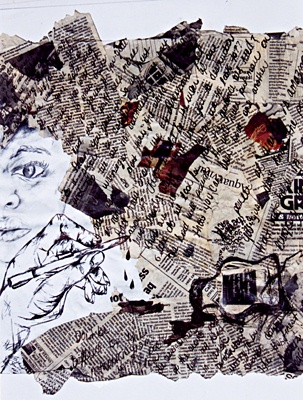All Nonfiction
- Bullying
- Books
- Academic
- Author Interviews
- Celebrity interviews
- College Articles
- College Essays
- Educator of the Year
- Heroes
- Interviews
- Memoir
- Personal Experience
- Sports
- Travel & Culture
All Opinions
- Bullying
- Current Events / Politics
- Discrimination
- Drugs / Alcohol / Smoking
- Entertainment / Celebrities
- Environment
- Love / Relationships
- Movies / Music / TV
- Pop Culture / Trends
- School / College
- Social Issues / Civics
- Spirituality / Religion
- Sports / Hobbies
All Hot Topics
- Bullying
- Community Service
- Environment
- Health
- Letters to the Editor
- Pride & Prejudice
- What Matters
- Back
Summer Guide
- Program Links
- Program Reviews
- Back
College Guide
- College Links
- College Reviews
- College Essays
- College Articles
- Back
The Conundrum of the American Identity: Restricting Freedom of Speech
At the crux of the American dream lies freedom: of press, of religion, of speech. Throughout history, the United States’ constitution of ostensibly unmitigated liberty, promising escape from ethnic persecution, has lured millions to the U.S. However, with the recent thunderstorms plaguing the political atmosphere of the U.S., it has become an incontestable fact that all freedom warrants limitations. Freedom of speech is undeniably a constitutional right of all American citizens, but when does it infringe on the equally universal right to security of person? By definition, freedom of speech encompasses hate speech, which encroaches on the territory of right to safety.
Hate speech (by definition, speech that is intended to insult a person based on race, religion, sexual orientation, or disability) is responsible for some of history’s most reprehensible acts of violence. For example, the Thomas Dixon’s 1905 play The Clansman is credited with igniting the Atlanta race riots of 1906, where mobs killed between 20-40 African Americans. The play lauded the Ku Klux Klan’s attempts to quash the Reconstruction (the period following the Union victory of the Civil War, during which blacks integrated into society and gained a voice growing in power, threatening the white population despite harsh Jim Crow laws) and spoke insultingly of black men:
“Since the dawn of history the negro has owned...Africa–rich beyond the dream of poet’s fancy...Yet he never picked [a diamond] up from the dust until a white man showed to him its glittering light...He lived as his fathers lived–stole his food, worked his wife, sold his children, ate his brother, content to drink, sing, dance, and sport as the ape!”
This play led to the loss of innocent lives, simply because so-called creative license always took precedence over racial justice. Hate speech in media reaches a wide audience, and despite being words, have the ability to incite unspeakable violence. The right to engage in bigoted speech is protected under freedom of speech, if held faithful to its textbook definition.
On December 10, 1948, the United Nations General Assembly adopted the landmark Universal Declaration of Human Rights. In this document, fundamental rights of humankind were universally acknowledged, including the right to security of person, which history has shown to be threatened by unreigned free speech. It is entirely feasible to allow and even champion freedom of speech as a right that defines America, while restricting aspects in the interest of protecting the welfare of its people.
It must be acknowledged at this point that freedom of speech is already confined by societal etiquette; for instance, telling a friend her dress is ugly is obviously taboo, and libel/slander are (circumstantially) considered torts- a civil wrong though not criminal, allowing victims grounds for a lawsuit. These common courtesies are proof today’s “free speech” is not entirely free, and placing restrictions upon it is not unreasonable, especially when the First Amendment itself never extended protection to inciting violence and copyright violations. Placing hate speech under similar constraint is hardly revolutionary, particularly after consideration of the violence it provoked.
The imperative question is where to draw the line between suppressing hate speech and freedom of expression. It is abundantly clear that this is where individual opinions diverge. At what point does it become criminal to express bias about other people? The simplest answer is the point at which opinion brings harm to certain demographics. A modern example is the issue of deportation, though no recent development, the Alien Act of 1798 dating to John Adam’s administration. However, President Trump, notorious for racist rhetoric such as calling white supremacists “very fine people” and Salvadorans “animals”, has racialized deportation, targeting not only immigrants with criminal records but all those of color with the proposed end of DACA, which protects more than 700,000 undocumented immigrants. By May 2018, nearly 1800 children were separated from their families upon crossing the border during deportation, sparking fury over such shameless dehumanization; immigrants of color who have committed no crime are being abused as a result of Trump’s internalized racism.
Freedom of speech can exist with limitations protecting right to security of person, which is threatened by hate speech. The difficulty in deciding these limitations lies in distinguishing between hate speech and expressing opinions, that many agree comes when opinions harm minorities. It’s a juggling act to preserve American identity and fundamental human safety without public outcry, but who said it was impossible?

Similar Articles
JOIN THE DISCUSSION
This article has 1 comment.

0 articles 0 photos 1 comment